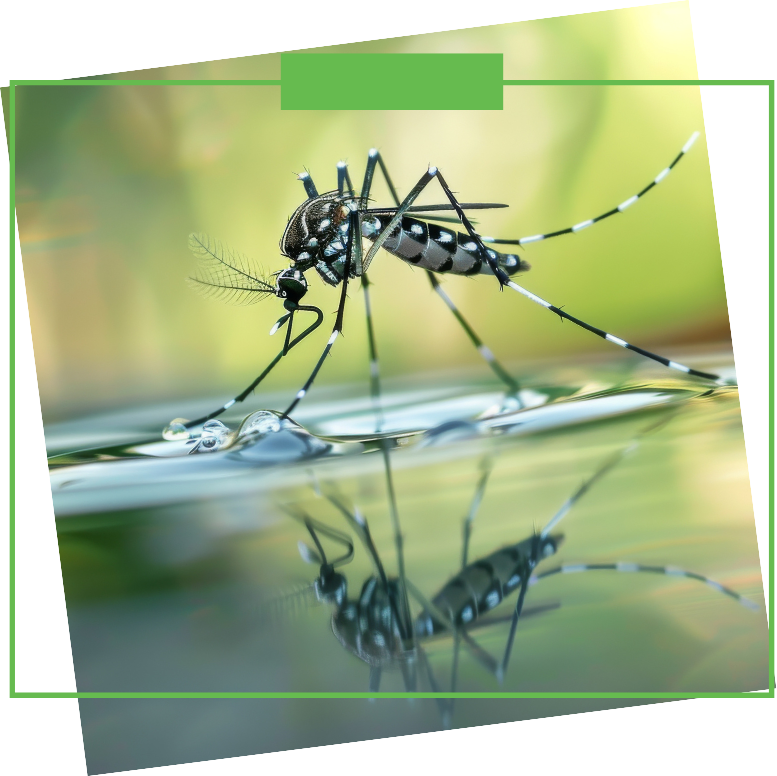Mosquitoes might be small, but their impact is anything but. These buzzing insects have a way of turning relaxing evenings into irritating, itchy ordeals. And beyond the annoyance, they bring serious health risks. Mosquitoes are known carriers of harmful viruses like West Nile, Zika, and various forms of encephalitis, making them far more than just a backyard nuisance. If you live in an area with standing water, thick vegetation, or warm, humid conditions, the chances of encountering them regularly are even higher.
Unlike some pests that hide in basements or behind walls, mosquitoes don’t bother with subtlety. They arrive in swarms, linger for hours, and leave behind itchy welts that can linger even longer. What makes them particularly difficult to deal with is how rapidly they reproduce. A single female can lay hundreds of eggs in a tiny amount of water, meaning even a forgotten flowerpot or clogged gutter can become a breeding ground. Left unchecked, what starts as a small annoyance can spiral into a persistent, property-wide infestation.
Where They Thrive And Why It Matters
Most people associate these annoying bugs with swamps or marshes, but the reality is that mosquito hotspots are often much closer to home. Shady areas of your yard, puddles in driveways, overwatered lawns, and birdbaths that haven’t been emptied regularly can all provide perfect conditions for them to thrive. It doesn’t take much—just a bit of moisture and warmth—and they’re right back, multiplying and feeding.
The trouble is, mosquitoes don’t just stay in one place. They follow carbon dioxide, body heat, and even certain scents to find hosts. That means no matter how clean you keep your home, they can still find their way onto your property if conditions are right. And once they’re in your space, homemade remedies and citronella candles rarely do much more than delay the inevitable. The real challenge lies in targeting their breeding sites and disrupting their life cycle at multiple points—not just chasing them away for a few hours.
Another overlooked aspect is how mosquitoes affect outdoor living. If you've invested time and money into your landscaping or enjoy hosting guests in your yard, a surge in their activity can make those spaces unusable. In many cases, people stop using their porches, patios, and outdoor kitchens simply because they can’t deal with the bites and the hassle. It becomes a quality-of-life issue, not just a pest problem.
The Risk Beyond The Itch
While the bites themselves are annoying, the bigger concern lies in what those bites can transmit. Mosquito-borne illnesses vary by region, but all carry significant health risks. Even if the chances of contracting a serious disease feel low, it only takes one infected mosquito to cause a chain reaction—especially for people with weakened immune systems, young children, or the elderly. And unlike seasonal illnesses that disappear with the colder months, mosquitoes tend to linger far longer than expected in many regions, particularly with rising global temperatures and changing weather patterns.
There’s also the mental toll to consider. Constant swatting, spraying, and scratching may not seem like a big deal at first, but over time, it becomes exhausting. Some people even develop allergic reactions to bites, leading to swelling, scarring, and in extreme cases, secondary infections. The idea that you have to tiptoe around your own backyard to avoid being bitten is frustrating—and frankly, no one should have to live like that.
Why Professional Control Makes The Difference
Trying to handle an infestation on your own is like plugging a leak with duct tape—it might seem effective temporarily, but it won’t hold up. Store-bought foggers and sprays can reduce the number of invaders that you see, but they rarely get to the root of the issue. Professional pest control services take a much deeper approach. Instead of treating symptoms, they investigate the underlying causes, identify breeding grounds, and apply targeted solutions that interrupt their entire life cycle.
This kind of comprehensive control strategy is key, especially during peak mosquito seasons. Trained specialists can spot the small water sources most people overlook, understand local pest behavior, and use treatments that work over time instead of offering a quick fix. It's not about blasting your yard with chemicals—it's about knowing exactly where to treat and how often, with a plan tailored to your property and your situation.
Additionally, utilizing professional control services gives you long-term results that DIY options struggle to match. Regular monitoring, strategic treatment applications, and preventative guidance can help keep mosquitoes from coming back, even in challenging environments. And when you’re not spending every evening ducking indoors or dousing yourself in bug spray, that kind of investment really starts to pay off.
Mosquitoes don’t just ruin a nice evening—they threaten your comfort, your health, and your ability to enjoy your own outdoor space. Whether you're dealing with a mild annoyance or a full-blown infestation, it’s important to get ahead of the problem before it spreads. We at Shoreline Pest Solutions can help by identifying hotspots, disrupting their breeding cycle, and offering solutions that go far beyond surface-level relief.
If you’re tired of swatting and scratching, contact today to ask questions, learn more about treatment plans, or schedule a service visit tailored to your property. It’s your home—don’t let mosquitoes dictate how you live in it.
Frequently Asked Questions About Mosquitoes
Q1. Why do mosquitoes seem to bite some people more than others?
A1. Mosquitoes are surprisingly selective when choosing their targets, and it's not just random. They're drawn to body heat, carbon dioxide, skin bacteria, and even specific blood types—people with Type O blood tend to get bitten more often than those with Type A. Wearing dark clothing, producing more body heat, or having recently exercised can also increase your chances of becoming a bite-magnet. Even subtle factors like skin chemistry and the scent of your sweat can make a big difference in how attractive you are to these pests.
Q2. Can mosquitoes survive indoors during the colder months?
A2. Yes, and it’s a common misconception that their entire population dies off completely in winter. While many do perish, some species have adapted to survive indoors by hiding in dark, undisturbed places like basements, garages, and laundry rooms. Females, in particular, can go into a dormant state called diapause, allowing them to overwinter inside and become active again once temperatures rise. That means if you’ve had mosquito issues in late fall, there’s a chance they’re still lurking inside your home, just waiting for spring.
Q3. Are mosquito bites just annoying, or can they lead to serious health issues in the U.S.?
A3. While a bite might seem like a harmless itch, it can actually be a gateway to serious health risks. In the U.S., they can transmit West Nile virus, Eastern equine encephalitis (EEE), and St. Louis encephalitis, among others. Although rare, these diseases can lead to severe neurological complications and, in extreme cases, death. Even bites that don’t transmit disease can become infected if scratched excessively. Taking preventative measures against mosquitoes isn’t just about comfort—it’s about safeguarding your health.



